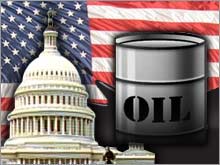Senators to Big Oil: Where's the money?
Considering a bill to block industry mergers, lawmakers call on executives to explain record profits, and offer ways to rein in prices.
NEW YORK (CNNMoney.com) - Senators, considering a bill to restrict energy industry mergers and tax breaks, grilled oil executives again Tuesday as to why they are reaping record profits while consumers pay record prices at the pump. In the second time industry executives have appeared before lawmakers in four months, members of the Judiciary Committee wanted to know why prices were so high and what could be done about it.
The main issue at hand was a proposed bill by the committee's chairman, Sen. Arlen Specter (R-Pennsylvania), that would limit oil and gas company mergers if the merger would impact supplies or prices. The legislation would also permit the government to take legal action against the Organization of the Petroleum Exporting Countries, or OPEC, for restricting oil supplies and fixing prices. Oil executives from Exxon Mobil Corp. (Research), Chevron Corp. (Research), ConocoPhillips (Research), the U.S. units of BP Plc (Research) and Royal Dutch Shell Plc (Research) and major oil refiner Valero Energy Corp (Research). appeared calm and well-spoken. They said restricting mergers or breaking up big companies wouldn't solve the price problem, as price is set on the world market and is driven by supply and demand, but would simply make U.S. companies less competitive in securing oil supplies in a tight race against big national oil companies from countries such as Russia and China. Sen. Charles Schumer, D-N.Y., sounded unconvinced. "You now have four players, prices have spiked and what has gone up has not come down. Coincidence? I think not," said Schumer. "We should explore divestiture." But during his opening remarks, ExxonMobil CEO Rex Tillerson said the company today accounted for a smaller share of global energy production than it did eight years ago, underscoring how worldwide demand has intensified the hunt for this finite resource. "If Americans are going to have access to energy, we need companies with the scale to compete," he said. Sen. Patrick Leahy, D-Vt., said that in spite of record oil company profits, the industry as a whole only invested roughly 3 percent of those profits in developing alternative energy sources. "Many would say that amount is negligible," said Leahy. "Where does the rest of it go?" The oilmen, pointing out that renewable energy is not their primary business, said most was returned to shareholders in the form of stock buybacks or dividend hikes. Sen. Joseph Biden, D-Del., asked the executives if, in a time of such prosperity, any of them still thought they needed the $2.8 billion in subsidies that went to the energy industry. No one responded. Exxon earned more than $36 billion last year, the biggest profit ever for a U.S. company. One of the few committee members not putting Big Oil through the ringer was Sen. John Cornyn, R-Texas. "It isn't a crime to make a profit," said Cornyn. "What can the government do that would be constructive to bringing prices down?" Exxon's Tillerson said it would be helpful if the government stopped introducing so many varieties of reformulated gasoline, while Royal Dutch Shell President John Hofmeister said officials should ease drilling regulations in places like Alaska and offshore on the continental shelf. "Some of the greatest untapped sources are here in the U.S.," Hofmeister said earlier during his introductory remarks. "If Congress wants to address supply and help these consumers, find a way to tap these resources." Artificially high prices?
Earlier the Senate committee heard testimony from public policy experts who accused energy companies of rigging prices by withholding supply in order to make a higher profit. David Boies, the well-known legal gun, appeared on behalf of a pipeline consortium. He told the committee that one reason natural gas is so expensive is because energy producers have killed plans to import natural gas from Alaska and instead bury excess supply under the ground in order to make more profits. BP's Ross Pillari said the gas was buried back in the ground because it helped sustain the oil field and, now that prices are high enough to make it economically feasible to transport, it will be brought to market sometime within the next eight to 10 years. But senators disputed the claim that a pipeline wasn't economically feasible to build. "I count six different times that a company came to you and said 'we'll build it if you put gas in it,'" said Biden, "and you all said no." Again, Biden's comment elicited no response. The hearing comes as gasoline prices are on the rise again as motor fuel demand picks up with the busy U.S. spring and summer driving seasons in sight. The national retail price for regular unleaded gasoline has jumped 11.2 cents over the past two weeks to $2.37 a gallon, the highest level since early November, the Energy Department reported Monday. Its supporters say the bill has a better chance of passing the Senate than the House, which is seen as more friendly to oil interests, according to Reuters. _____________________
What will the Dubai debacle cost us? Click here |
| |||||||||||||||||||||||||||||||



